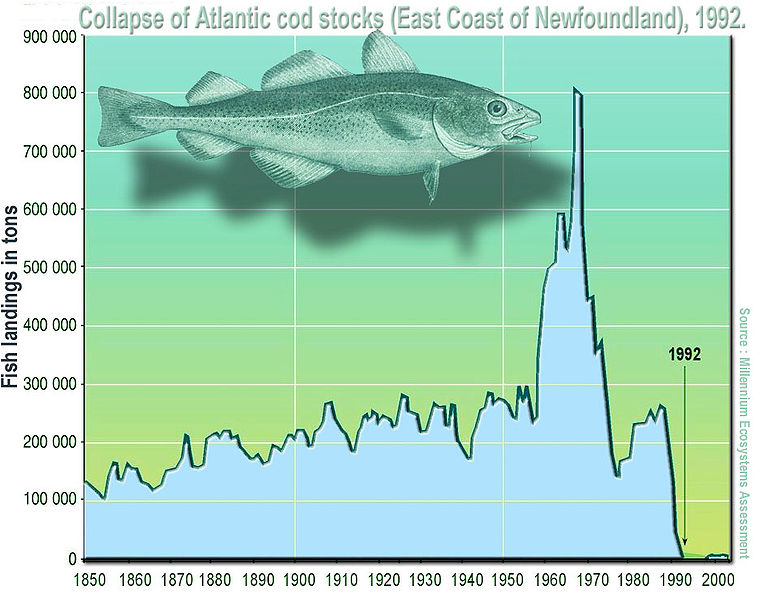
Image credit: Lamiot
I finally just read an article I’ve been saving from the New Yorker, published on August 2, 2010. It’s a book review titled “The Scales Fall” by Elizabeth Kolbert or rather a book review summing up the problems discussed in four books: “Saved by the Sea: A Love Story with Fish” by David Helvarg; “Managed Annihilation: An Unnatural History of the Newfoundland Cod Collapse” by Dean Bavington; “Four Fish: The Future of the Last Wild Food” by Paul Greenberg; and “Five Easy Pieces: How Fishing Impacts Marine Ecosystems.”
Some great titles for sure, I really love the managed annihilation bit. But all joking aside, these books tell stories of the ocean’s destruction and more specifically over-fishing.
Here’s a few noteworthy quotes from Kolbert:
“David Helvarg notes that each year sharks kill some five to eight humans worldwide; meanwhile we kill a hundred million of them.”
“In the late 1980’s, the total world catch topped out at around 85 million tons. For the past two decades the global catch has been steadily declining.”
“Callum Roberts, a professor of marine conservation at England’s University of York, has calculated that there is now only one bluefin left for every 50 that were swimming in the Atlantic in 1940.”
But I’m saving the craziest for last. Kolbert pinpoints the moment in time when people acquired a devastating way of thinking about our oceans. According to Kolbert, this moment took place at the Great International Fisheries Exhibition in London in the faraway time of 1883.
To launch this grand event, Thomas Huxley, president of Britain’s Royal Society, delivered the opening address. While the name Huxley may mean little to you and me, Kolbert explains he is remembered for supporting Charles Darwin in the early days.
Well Huxley gave his little spiel and said these regretful words: “Probably all the great sea fisheries are inexhaustible; that is to say that nothing we do seriously affects the number of the fish.” Based on Kolbert’s retelling of the events, Huxley actually goes on to discuss how the real problem is the backwardness of the fishing industry and how far behind fishing is compared to other industries making great strides in production like agriculture.
But wait, it gets worse. “In 1955, Francis Minot, the director of the Marine and Fisheries Engineering Research Institute, in Woods Hole, Massachusetts, co-wrote a book titled, ‘The Inexhaustible Sea.’”
It’s not clear what type of information Huxley and Minot possessed to be able to label the ocean as inexhaustible, that’s just ludicrous. When humans just take and take, every resource eventually becomes finite, the ocean is no exception.
Only when limits are set and humans serve as guardians of our ocean resources will those resources continue to provide for generations to come. But if our current way of governing the oceans persists, then many precious resources will be lost. It’s already happening; the Newfoundland cod is just one of many examples. And just to be clear, the ocean is an exhaustible resource, that’s a fact.
Preparing a lecture entitled “Shifting Paradigm in the Sea” … this article is most helpful and I wish to express my gratitude.
Jack Grove
Senior Author FISHES OF THE GALAPAGOS (Grove & Lavenberg, 1997) Stanford University Press
Thanks Jack! Great to hear it was helpful. I hope the lecture went really well!